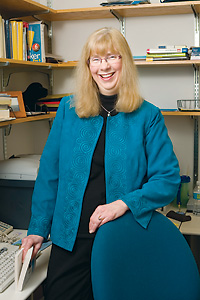During her workdays as an administrative assistant, Cindy Glovinsky — who also is a clinical social worker — has uncovered some useful tricks for those seeking peace of mind at work.
One suggestion is adding a full or partial walk to work, which decreases sensory deprivation and the feeling of cubicle confinement that may creep up during the day. Listening to music with headphones or making brief notes about feelings in a journal she calls a “work companion” also can increase occupational satisfaction, says Glovinsky, who works at the Institute for Social Research (ISR).

Photo by Scott Soderberg, U-M Photo Services.
Her time at U-M started in 1970 with a clerk-typist job at the hospital blood bank and has continued intermittently over the last 40 years. In between U-M jobs, Glovinsky earned master’s degrees in social work and English. After 10 years away from the university developing a counseling practice, she came back to U-M — this time at ISR.
“After a decade as a self-employed social worker, I went through a difficult adjustment period,” she says. In addition to getting used to having a boss again, she had to adjust to a faster paced, more technologically advanced workflow.
To cope with the stress, Glovinsky began journaling. This led to her deciding to share her ideas in a newly published book, “Making Peace with Your Office Life” (St. Martin’s Press), drawing on her expertise as a mental health professional. She also shares her revelations at www.cindyglovinsky.com. In conducting research, Glovinsky studied the works of humorists as well as scholarly researchers. “I learned as much from ‘Dilbert’ and ‘The Office’ about the challenges office workers face as from psychologists,” she says.
As the economy worsened, Glovinsky came to feel that her perspectives had a more serious tone. “The unemployed are not the only ones who suffer in hard times,” she says. “The employed are nervous about losing their jobs and often feel overwhelmed having to do the work of others who have been let go. There’s a lot more pressure.”
In her writing, she explores the different emotions and challenges office workers may experience and offers a plethora of simple suggestions for making a routine nine-to-five day more enjoyable. A part-time private practice psychotherapist, Glovinsky stresses the importance of processing feelings at work.
“Office cultures have a history of encouraging people to check their feelings at the door, numb themselves and just get through it,” she says, “but 40 hours a week is an awful big chunk of your life to just ‘get through.’”
Glovinsky describes her job at ISR as “half administrative, half editorial.” Her primary duty is supporting Yu Xie, Otis Dudley Duncan Professor of Sociology and Statistics and research professor at ISR, who directs the Survey Research Center’s Quantitative Methods Program. She helps with grant proposals, monitors expenses and reconciles PCards. She also edits manuscripts and, for three years, served as managing editor of the journal Sociological Methodology while Xie was the editor.
“The tasks are diverse so I don’t get bored.” she says. “I’m also supporting a top researcher, so the work is intellectually interesting, and ISR is an exciting place to be.”
Glovinsky, who also is a musician, understands firsthand the importance of finding time for passions outside of work. She attended the prestigious Interlochen Center for the Arts, played the violin professionally and now sings in the choir at St. Andrews Episcopal Church.
“Maintaining outside interests, whether social, creative or athletic, is key to finding inner peace at work,” she says.
The weekly Spotlight features staff members at the university. To nominate a candidate, please contact the Record staff at [email protected].

